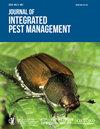佛罗里达州养鹿户对植物和节肢动物害虫的管理
IF 2.7
3区 农林科学
Q1 ENTOMOLOGY
引用次数: 3
摘要
养鹿业是一个不断发展的畜牧业。与现有的畜牧业一样,叮咬节肢动物的害虫控制是一项挑战,但鹿农对害虫控制方法的了解有限。为了填补这一知识空白,并评估是否正在使用推荐的综合虫害管理(IPM)计划,我们通过在线问卷调查了佛罗里达州养鹿户的虫害管理计划。在佛罗里达州接受调查的养鹿户中,94%的人报告称使用化学物质控制植物和节肢动物害虫。养鹿户报告说,控制叮咬的侏儒、蚊子、马蝇和鹿蝇作为他们的目标节肢动物。报道的主要除草剂和节肢动物靶向农药分别是草甘膦和氯氰菊酯。三分之二的养鹿户报告说,他们担心自己的鹿对杀虫剂的耐药性,72%的养鹿人报告说,在管理程序开始时,他们使用了诸如交替使用杀虫剂或减少使用杀虫剂等抗药性缓解技术。大多数(66%)养鹿户报告说,他们使用了多种控制技术。未来的工作应侧重于根据研究结果制定最佳管理实践,以及为养鹿户使用IPM的教育材料。这些工具加在一起应该通过促进安全和可持续的节肢动物管理来改善鹿场的动物健康和福祉。本文章由计算机程序翻译,如有差异,请以英文原文为准。
Management of Plant and Arthropod Pests by Deer Farmers in Florida
Deer farming is a growing livestock industry. As with established livestock farming, biting arthropod pest control is a challenge, but knowledge about pest control practices being utilized by deer farmers is limited. To fill this knowledge gap and to assess if recommended integrated pest management (IPM) programs were being used, we surveyed Florida deer farmers about their pest management programs via an online questionnaire. Of surveyed deer farmers in Florida, 94% reported using chemicals for plant and arthropod pest control. Deer farmers reported controlling biting midges, mosquitoes, horse flies, and deer flies as their target arthropods. The primary herbicide and arthropod-targeted pesticide reported were glyphosate and permethrin, respectively. Two thirds of deer farmers reported that they were concerned about pesticide resistance developing on their properties, and 72% reported utilizing resistance mitigation techniques such as alternating pesticides or using less pesticide at the start of a management routine. A majority, 66%, of deer farmers reported using a combination of control techniques. Future work should focus on best management practice development based on the study findings, as well as educational materials regarding IPM use for deer farmers. Together these tools should improve animal health and well-being on deer farms by facilitating safe and sustainable arthropod management.
求助全文
通过发布文献求助,成功后即可免费获取论文全文。
去求助
来源期刊

Journal of Integrated Pest Management
Agricultural and Biological Sciences-Insect Science
CiteScore
5.80
自引率
3.60%
发文量
24
审稿时长
25 weeks
期刊介绍:
Journal of Integrated Pest Management is an open access, peer-reviewed, extension journal covering the field of integrated pest management. The Editors-in-Chief are Dr. Marlin E. Rice (formerly with Iowa State University) and Dr. Kevin L. Steffey (formerly with the University of Illinois). The journal is multi-disciplinary in scope, publishing articles in all pest management disciplines, including entomology, nematology, plant pathology, weed science, and other subject areas.
 求助内容:
求助内容: 应助结果提醒方式:
应助结果提醒方式:


